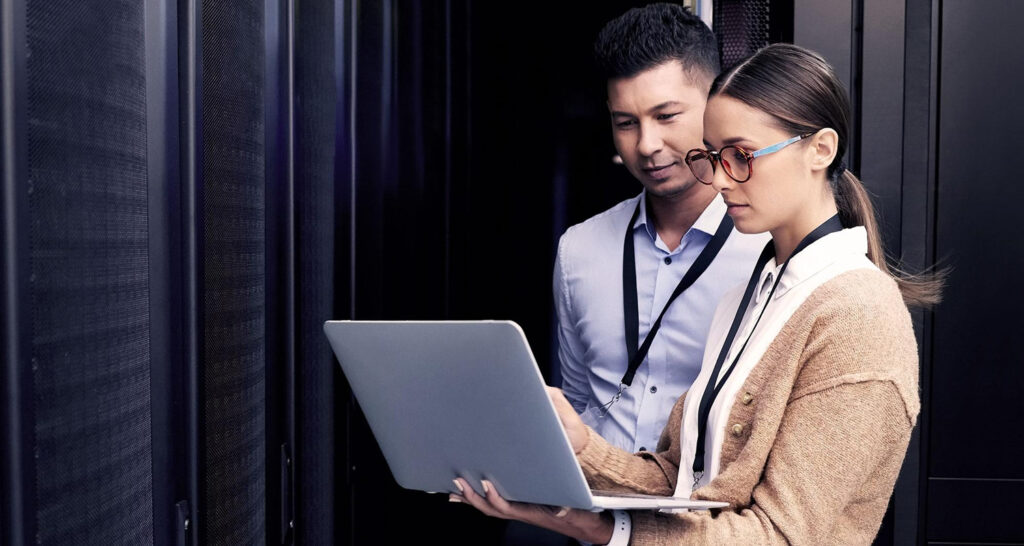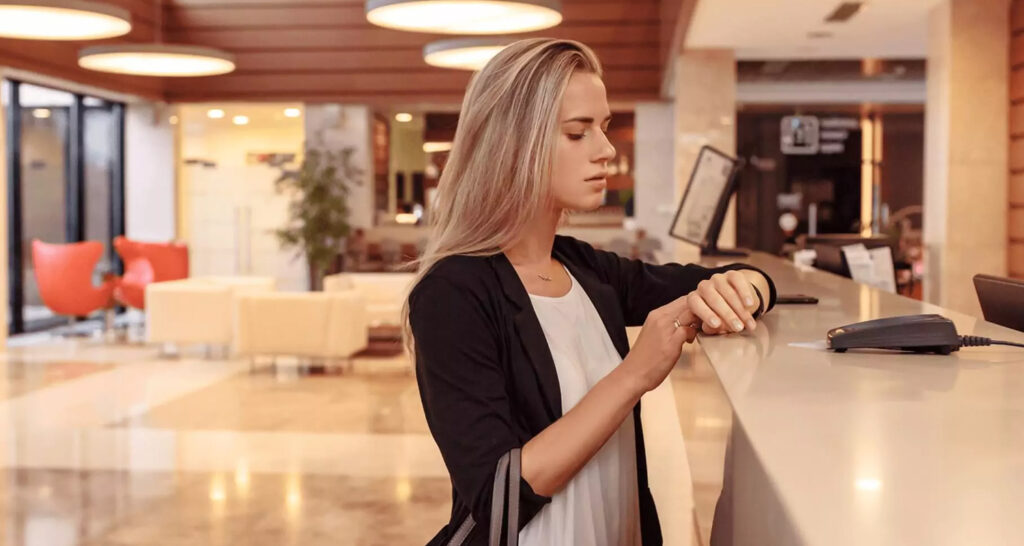Technology, once a mere complement to hospitality, has now evolved into its driving force. It’s not just a facilitator; it’s the maestro conducting a symphony of innovations that resonate through every facet of the guest experience. From the initial point of reservation to the final check-out, technology acts as the unseen hand that crafts seamless, efficient, and personalized interactions.
Contactless Check-ins

In the evolving narrative of hospitality, the overture is now set by the seamless and efficient melody of contactless check-ins.
Concept of Contactless Check-ins:
Contactless check-ins redefine the traditional arrival experience by eliminating physical touchpoints between guests and front-desk staff. This innovative process is facilitated through digital interfaces, allowing guests to check in remotely using their smartphones, tablets, or self-service kiosks within the hotel premises.
Key Components of Contactless Check-ins:
- Mobile Apps: Guests can use dedicated hotel mobile apps to check in, receive digital room keys, and access a range of services.
- Self-Service Kiosks: Physical kiosks within the hotel enable guests to complete check-in procedures independently, minimizing the need for face-to-face interactions.
- Online Portals: Web-based platforms allow guests to pre-register and provide essential information before arriving at the hotel
Benefits of Streamlined Check-in Processes:
For Guests:
- Personalization: Digital interfaces enable guests to customize their stay preferences, from room specifications to amenity requests.
- Enhanced Safety: Particularly relevant in the context of health and safety concerns, contactless check-ins minimize physical interactions, contributing to a more secure experience.
- Efficiency and Time Savings: Streamlined check-ins reduce waiting times, allowing guests to swiftly enter their rooms and commence their stay.
The future of check-ins is not just about the absence of queues; it’s about the presence of a guest-centric, technology-driven symphony, promising a stay that begins on a note of ease and sophistication.
Smart Room Features

In our exploration of the Tech Symphony in Hospitality, the spotlight now shifts to the orchestration of smart room features
Showcasing IoT Applications in Hotel Rooms:
- Connected Devices: The concept of interconnected devices within a hotel room, where various elements seamlessly communicate to enhance guest comfort.
- IoT Sensors: Integration of sensors that gather data on guest preferences, occupancy, and environmental conditions to optimize the room’s ambiance.
- Centralized Control: The central control hub, often a mobile app or in-room tablet, empowers guests to manage multiple functions with a touch or voice command.
Smart Lighting for Ambiance and Energy Efficiency:
- Personalized Lighting Scenes: Smart lighting systems enable guests to create personalized lighting scenes based on mood or activity.
- Motion Sensors: The integration of motion sensors that adjust lighting automatically, contributing to energy conservation when the room is unoccupied.
- Circadian Rhythm Lighting: The benefits of circadian rhythm lighting are that adjusts color temperature throughout the day, promoting guest well-being.
Smart Thermostats for Climate Control:
- Individual Climate Preferences: Smart thermostats allow guests to set and personalize room temperatures to their liking.
- Occupancy Sensors: The use of occupancy sensors to optimize heating or cooling based on guest presence, ensuring energy efficiency.
- Integration with IoT: Smart thermostats can integrate with other IoT devices, such as blinds and lighting, for a synchronized room environment.
- Smart Blinds for Natural Light Management:
- Energy Conservation: Automated blinds contribute to energy efficiency by optimizing natural lighting and reducing the need for artificial lighting.
- Guest Customization: The ability for guests to control blinds through a mobile app or in-room controls, allowing for personalized adjustments.
- Automated Light Regulation: Smart blinds can adjust automatically to regulate natural light, enhancing guest comfort and minimizing glare.
Virtual Concierge Services

In the grand narrative of the Tech Symphony in Hospitality, the spotlight now falls on the enchanting realm of Virtual Concierge Services
Exploring AI-Powered Chatbots for Guest Queries:
- Chatbot Capabilities: The functionalities of AI-powered chatbots are designed to simulate natural conversations and respond to guest queries.
- Instant Assistance: The immediacy of response, providing guests with instant information on services, local attractions, and hotel amenities.
- 24/7 Availability: The advantage of round-the-clock availability, ensures that guests can seek assistance at any time during their stay.
Virtual Assistants for Personalized Recommendations:
- Personalization Algorithms: Virtual assistants leverage guest data to offer personalized recommendations, from dining options to leisure activities.
- Tailored Suggestions: The ability of virtual assistants to understand guest preferences and provide tailored suggestions, enhancing the overall guest experience.
- Integration with Smart Rooms: The synergy between virtual assistants and smart room features, creates a cohesive and personalized stay for guests.
Looking to the Future:
- Feedback Loops: The role of virtual concierge services in gathering guest feedback, contributing to continuous improvement and service refinement.
In the symphony of virtual concierge services, technology, and hospitality dance in harmony, creating an orchestration of convenience, personalization, and efficiency.
Tech Innovations and the Guest Experience

- Efficient Operations: Explore how technology streamlines operational processes, reducing wait times and creating a more efficient environment for guests.
- Smart Room Personalization: Highlight the role of smart room features in tailoring the room environment to guest preferences, creating a personalized and comfortable space.
- Seamless Arrival and Departure: Discuss how contactless check-ins set the tone for a seamless and stress-free arrival, allowing guests to commence their stay effortlessly.
Tech Innovations and the Guest Experience:
- Seamless Arrival and Departure: Contactless check-ins set the tone for a seamless and stress-free arrival, allowing guests to commence their stay effortlessly.
- Efficient Operations: Technology streamlines operational processes, reducing wait times and creating a more efficient environment for guests.
- Smart Room Personalization: The role of smart room features in tailoring the room environment to guest preferences, creating a personalized and comfortable space.
Personalized Recommendations Based on Guest Preferences:
- Data-Driven Insights: Technology collects and analyzes guest data to understand preferences, from room temperature to preferred amenities.
- Virtual Concierge Contributions: Virtual concierge services leverage guest data to offer personalized recommendations for dining, activities, and local attractions.
- Enhanced Decision-Making: The value of personalized recommendations in helping guests make informed decisions, ensuring that their stay aligns with individual preferences.
Concerns Related to Data Security and Privacy

- Tokenization: The concept of tokenization, where sensitive data is replaced with unique tokens, minimizing the risk associated with storing actual data.
- Secure Wi-Fi Networks: Secure Wi-Fi networks prevent unauthorized access and protect guest data from potential cyber threats.
- Encryption Technologies: The use of encryption to secure data during transmission and storage, ensuring that sensitive information remains indecipherable to unauthorized entities.
- Regular Audits and Compliance: Regular security audits and compliance with data protection regulations identify vulnerabilities and ensure adherence to industry standards.
Technologies Safeguarding Guest Information:
- Biometric Authentication: The implementation of biometric authentication secures access to sensitive areas, such as guest rooms or personal information databases.
- Advanced Authentication Protocols: The adoption of multi-factor authentication protocols, adds an extra layer of security beyond traditional username-password combinations.
- Firewalls and Intrusion Detection Systems (IDS): Firewalls and IDS work in tandem to monitor network traffic, detect suspicious activities, and prevent unauthorized access.
Regulatory Compliance:
- GDPR and Other Regulations: The hospitality industry adheres to global data protection regulations, such as the General Data Protection Regulation (GDPR), ensuring that guest data is handled with utmost compliance and responsibility.
Continuous Improvement and Adaptation:
- Cybersecurity Training: Ongoing cybersecurity training for staff to stay updated on the latest threats and preventive measures.
- Incident Response Plans: Having robust incident response plans in place to address and mitigate potential data breaches promptly.
Smart Hotel Infrastructure

In the exploration of the Tech Symphony in Hospitality, the spotlight now shifts to the grand stage of smart hotel infrastructure—an ensemble of innovations that revolutionize the way hotels manage their operations.
Innovations in Hotel Infrastructure Management:
- Centralized Control Hubs: The implementation of centralized control hubs enables seamless management of various hotel systems, including HVAC, lighting, security, and more.
- Internet of Things (IoT) Integration: IoT devices and sensors are contributing to the interconnectedness of hotel infrastructure, allowing real-time monitoring and data-driven decision-making.
Smart HVAC Systems for Climate Control:
- Occupancy Sensors: Explore the integration of occupancy sensors that adjust room climate settings dynamically, ensuring comfort while conserving energy.
- Remote Monitoring and Maintenance: Highlight the advantages of remote monitoring, allowing hotel staff to identify and address HVAC issues promptly, reducing downtime, and enhancing guest comfort.
- Energy-Efficient Temperature Regulation: Smart HVAC systems optimize temperature control based on occupancy and external conditions, minimizing energy consumption.
- Integration of Technology for Efficient Hotel Operations:
- Predictive Maintenance: The use of predictive maintenance algorithms anticipates equipment failures, enabling proactive interventions to prevent disruptions.
- Staff Communication Platforms: The integration of communication platforms facilitates seamless coordination among hotel staff, improving response times and overall operational efficiency.
- Automated Room Service Requests: The implementation of systems allows guests to place room service requests through mobile apps or in-room tablets, streamlining the service delivery process.
Tech-Driven Marketing and Guest Engagement

In the ever-evolving landscape of the Tech Symphony in Hospitality, the narrative extends beyond seamless operations to embrace the enchanting realm of tech-driven marketing and guest engagement.
Technology in Marketing Strategies for Hotels:
- Digital Presence: The importance of a robust digital presence, includes a user-friendly website and engaging social media profiles, as the foundation of hotel marketing.
- Content Marketing: The role of content marketing, including blogs, videos, and virtual tours, in conveying the unique offerings and experiences of a hotel.
- Search Engine Optimization (SEO): SEO techniques enhance the visibility of hotels in online searches, attracting potential guests and driving website traffic.
The Role of Social Media in Guest Engagement:
- Visual Storytelling: The power of visual storytelling on platforms like Instagram and Pinterest, showcases the aesthetic appeal of the hotel, its amenities, and the overall guest experience.
- Community Building: Hotels leverage social media to build a community, encouraging guests to share their experiences, testimonials, and user-generated content.
- Real-Time Engagement: The real-time engagement opportunities social media platforms offer, enable hotels to respond promptly to inquiries, feedback, and trends.
- In this movement of the Tech Symphony, tech-driven marketing and guest engagement emerge as a vibrant crescendo, weaving together the threads of digital storytelling, targeted outreach, and loyalty-building strategies.
Future Trends and Innovations

Biometric Security:
- Facial Recognition: The facial recognition technology for streamlined and secure check-in processes, provides a seamless and contactless experience for guests.
- Fingerprint Scanning: The potential of fingerprint scanning as a secure method for accessing hotel rooms, amenities, and secure areas, enhancing overall security protocols.
- Voice Recognition: Voice recognition technology, enables personalized interactions and controls within hotel rooms or through virtual concierge services.
Augmented Reality (AR):
- Virtual Tours and Experiences: Hotels can leverage AR to provide virtual tours of their facilities, allowing potential guests to explore rooms, amenities, and common areas before booking.
- Interactive Information Displays: The use of AR in interactive displays within hotel rooms, offering information about local attractions, dining options, and personalized recommendations.
- AR-enhanced Menus and Services: The potential for AR-enhanced menus in hotel restaurants and AR guides for guests to navigate the hotel premises efficiently.
Immersive Guest Experiences:
- Sensor Technologies: The sensor technologies create responsive and adaptive environments within hotel rooms, adjusting lighting, temperature, and ambiance based on guest behavior and preferences.
- Virtual Reality (VR): The integration of VR for immersive guest experiences, from virtual travel previews to in-room entertainment options.
- AI-driven Personalization: Artificial intelligence (AI) can enhance guest experiences by predicting and responding to individual preferences, creating a more tailored and memorable stay.
In the crescendo of innovation, the Tech Symphony in Hospitality harmonizes seamless experiences, promising a future where every stay is a symphony of comfort, efficiency, and boundless possibilities. Safe travels, and may your journeys be filled with the sweet echoes of warm welcomes and technological enchantment.
